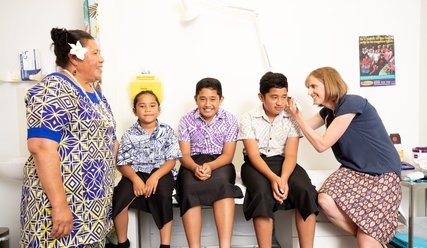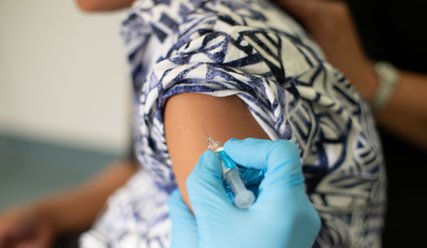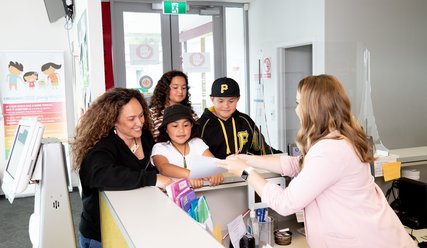Tradie, rugby player, father, doctor: How brick laying set the foundation for a career in medicine
From a young age, Dr Tiwnini Hemi understood the meaning of hard work.
Every weekend, school holidays, and most evenings, he and his four brothers built houses with their father, who was a brick layer by trade.
At just 11 years old, he and his brothers helped their father build a house for a doctor in their hometown of Hamilton. It took them four months to complete.
It was hard, laborious work – not for the faint hearted. The payoff would be a straight trade with the house owner – a set of braces.
“I remember going to this professional’s house. He was an orthodontist. It was a swap job, so we built his house, and he gave us braces for my sister’s teeth. And I would take my sister to the appointments, and she would be in and out of there in five minutes.
I can remember having this conversation with my dad, I would say, "Dad, how is that fair?"
"How is that fair that we’re here every weekend, every holiday, building his house. It takes us weeks and weeks to finish – but it only takes the doctor five minutes to do his job’. And my dad said, ‘It’s because we’ve chosen to earn our living this way, and he’s chosen to earn his living that way. So, when you’re older, I suggest you choose his way’. So, I did.””
It was this experience that would set in motion Dr Hemi’s plan for a career medicine, a career that has spanned 25 years.
Dr Hemi, who descends from Ngāti Koata, started his first medical centre as a sole general practitioner and owner, before establishing Avalon Medical in Hamilton in 2013.
“Being a solo GP is really difficult. It’s hard to find locums and I was working too hard, so I knew I needed to expand.
“I found a warehouse and with my tradie contacts, I managed to kit it out in four months.”
Being a GP also allowed Dr Hemi to pursue other interests at weekends, including rugby. He was a lock for the Māori All Blacks and the Highlanders, and in his “old-man” years, played as a prop.
He has also entered into the field of clinical trials, an area of medicine that offers a different pace than the day-to-day of being a GP.
The practice has already run a number of different trials for various conditions including the treatment of COVID-19, asthma, respiratory illnesses, and obesity.
The practice is located in a high-needs area and caters to about 12,000 patients – with a large number of patients identifying as Māori or Pasifika.
There are 30 staff on site, half who identify as Māori, Dr Hemi said.
“Being a bricklayer and a builder, you learn very practical skills. I realised that medicine was a very practical and logical skill, so that was an attraction for me.”
While his early experience as a tradie spurred his interest in medicine, it was a friend’s older brother that influenced his decision to enrol into medical school.
“His name was Dave Gilgen. We went to school together and I was friends with his younger brothers,” Dr Hemi said.
“He was the only Māori person I knew who was a doctor and he was doing so well. I heard about all his accomplishments, and I thought, ‘Wow. Well, if he can do it, I can do it, too’,”.
There were few Māori students at Otago Medical School when Dr Hemi attended, and maybe three or four at graduation.
Thirty years on, when his own children graduated, he was pleased to see between 30 and 40 future Māori doctors and nurses.
“There’s a saying: If your father is a brick layer, all the son’s become brick layers.
“It was tough work - it is tough work - and had I not had those earlier experiences; I may have followed my father in his trade.
“And despite seeing me work hard, long days, my children have pursued careers in medicine, too. However, they’ve been exposed to how other specialties work. Similar to me with my dad. And neither of them has decided to pursue being a GP.”
Dr Hemi’s eldest son is an ophthalmology registrar in Auckland. His eldest daughter works as a nurse at his Hamilton practice. And his youngest daughter is a house surgeon at Rotorua Hospital.
The second and third sons are studying medicine at Otago University, and his youngest son is still in Year 12 at high school.
The decision to open a practice and employ GPs was Dr Hemi’s solution to working smarter, by having colleagues who can cover shifts when need be.
But while it was a good idea in theory, it hasn’t quite worked out that way. Several doctors have left to work in Australia, some have retired, and some reduce their hours to balance work and life. This means Dr Hemi is still working just as hard, only with a few thousand more patients than he previously had.
“I think my capacity to work has been influenced by seeing how hard my dad worked.
“It’s hard work but I love being a GP. You’re fixing a broken ankle one minute, and the next you’re helping a person with their mental health. It’s an amazing job with such a wide scope of skills that’s required.
“If Elon Musk was to take one doctor to Mars, it should be a GP. That’s because of the wide range of skills we develop. And if you’ve been doing it as long as I have, that’s a really long list.”


